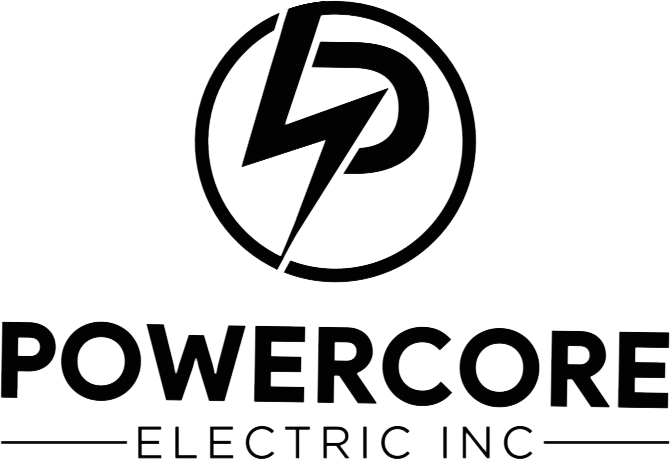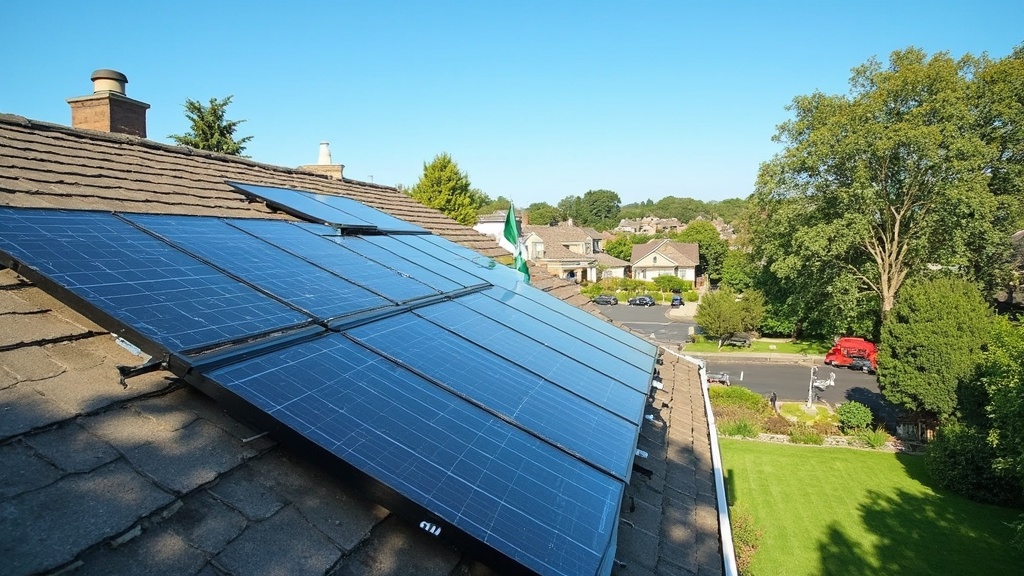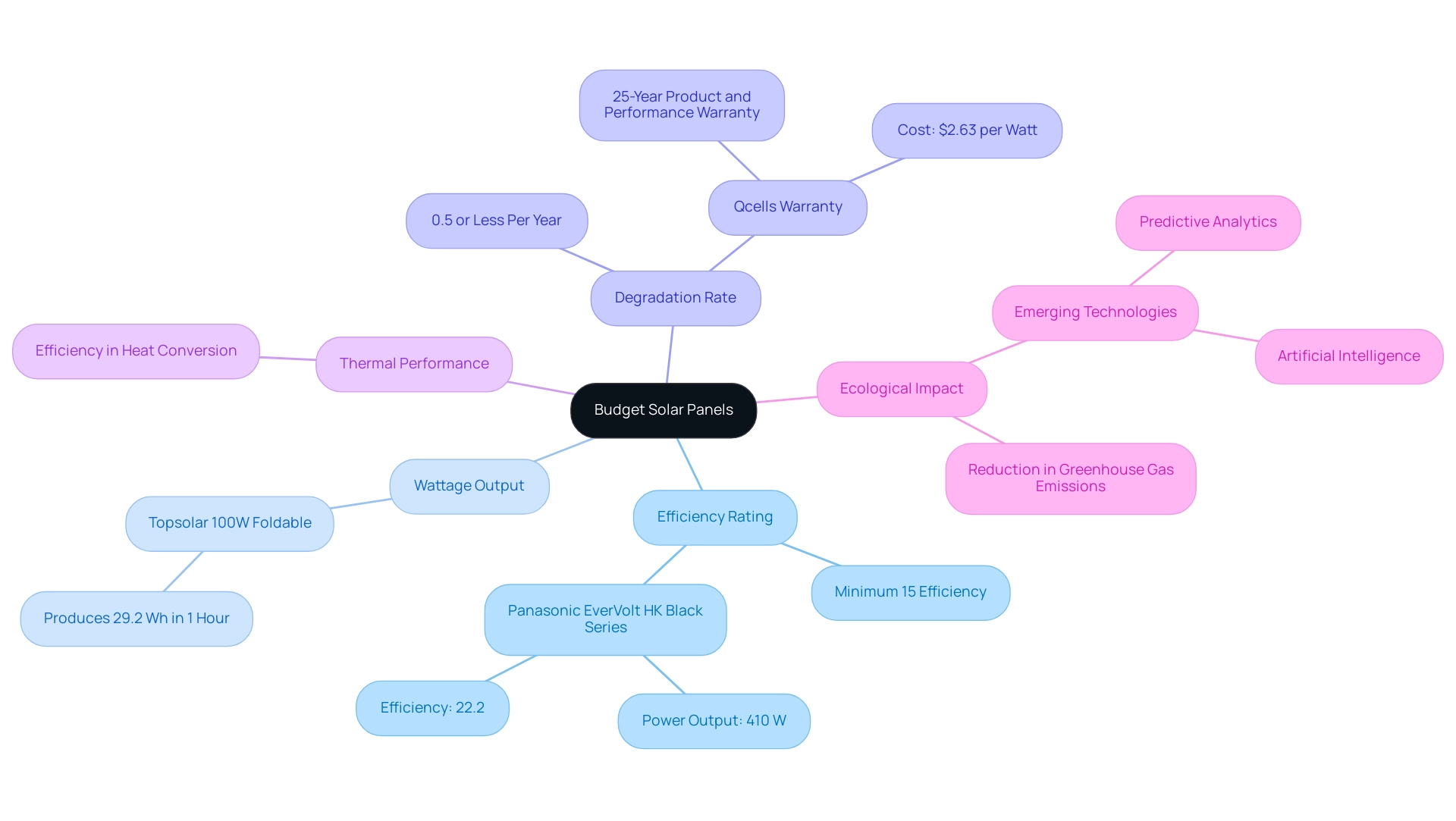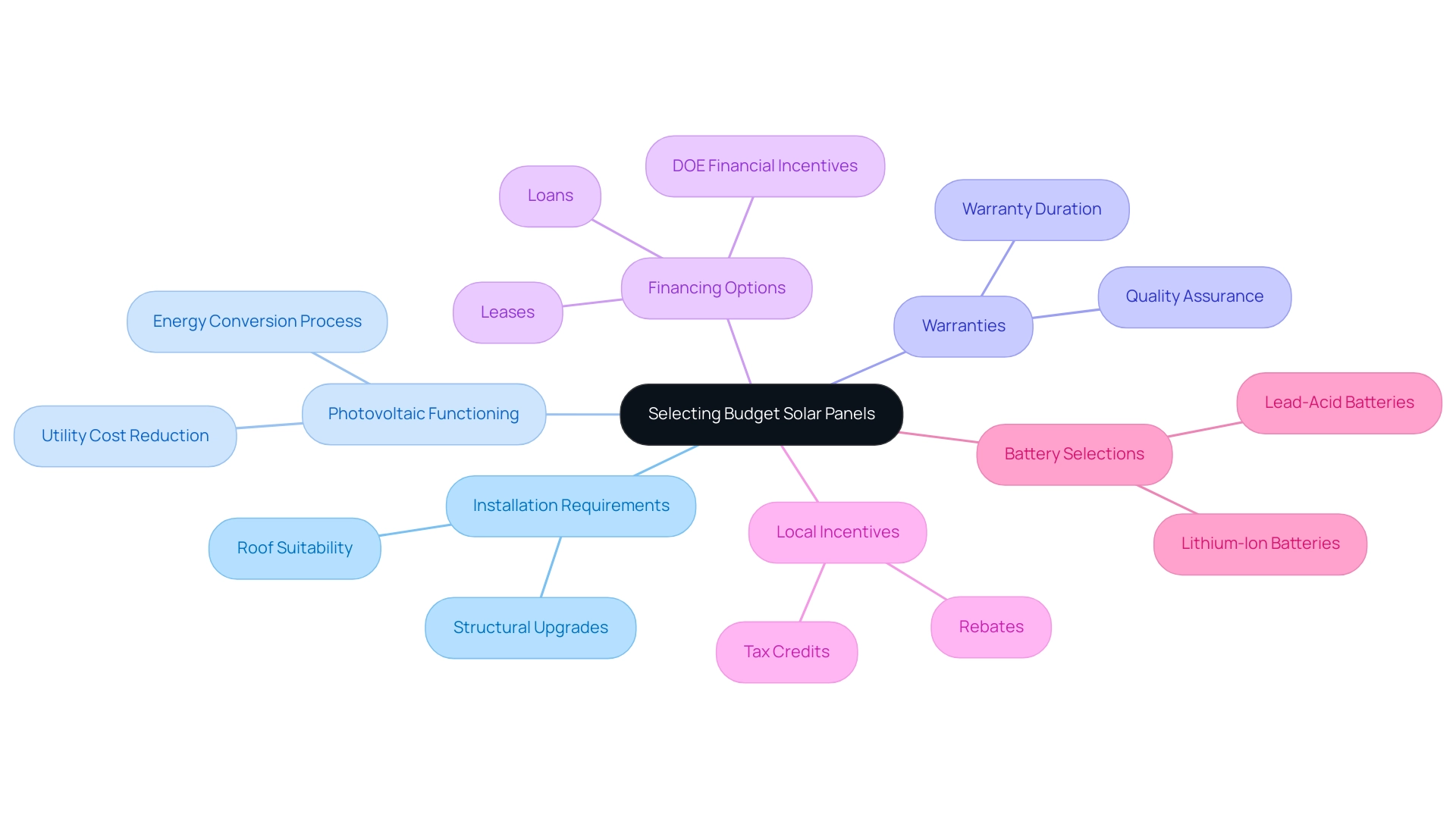Introduction
Navigating the world of solar panels can feel overwhelming, especially for homeowners looking to make eco-friendly choices without breaking the bank. With budget solar panels becoming increasingly popular, understanding the key factors that influence their performance, costs, and long-term savings is essential. This guide dives into the critical metrics to evaluate, from efficiency ratings to installation costs, ensuring that homeowners can confidently choose the right solar solution for their needs.
By considering reputable brands, exploring local incentives, and weighing the pros and cons of budget options, homeowners can take meaningful steps toward harnessing solar energy while enjoying the financial and environmental benefits that come with it.
Evaluating the Performance of Budget Solar Panels
When you’re searching for the best budget solar panels, it’s essential to monitor important performance metrics that will impact your energy savings while also considering the environment. Begin with the performance rating, which shows how effectively a module transforms sunlight into usable electricity. Aim for modules that boast at least a 15% efficiency rating; for instance, the Panasonic EverVolt HK Black Series impresses with a power output of 410 W and an efficiency of 22.2%.
Next, consider wattage output—higher wattage translates to greater energy production, which can significantly affect your electricity bills. For instance, the Topsolar 100W Foldable produces 29.2 Wh in only 1 hour of direct sunlight, demonstrating practical wattage output for the best budget solar panels. Don’t disregard the degradation rate either; this metric shows how quickly a module may lose effectiveness over time.
A solid budget committee should ideally degrade at a rate of 0.5% or less annually, ensuring you invest in the best budget solar panels over the years. Qcells offers a competitive warranty that underscores their commitment to performance, with a degradation rate of just 0.5% per year, costing around $2.63 per watt. Furthermore, take into account the thermal performance rating, which assesses how effectively a photovoltaic system transforms sunlight into usable heat.
This is crucial for maximizing energy output and minimizing operational costs. It’s also worth mentioning that under less than ideal conditions, photovoltaic systems may generate only 10 to 25% of their typical output, emphasizing the significance of efficiency ratings in practical situations. To further ensure you’re making an informed choice, dive into customer reviews and independent testing results of the best budget solar panels, which will help you gauge the real-world performance of the products you’re considering.
Furthermore, the ecological effect of solar devices cannot be ignored; utilizing sunlight can greatly diminish greenhouse gas emissions, aiding in a healthier planet. Emerging technologies like predictive analytics and artificial intelligence are also enhancing the efficiency and performance of energy systems, making this renewable energy not only a sustainable choice but also a financially sound investment for eco-conscious homeowners.
Understanding Costs and Savings with Budget Solar Panels
When considering the best budget solar panels, you can expect to find prices ranging from $0.50 to $1.00 per watt. To better understand your total expenses, simply multiply the price per watt by the total wattage required for your energy system. For instance, if you’re looking at a 5 kW system, your investment could range from $2,500 to $5,000.
Don’t forget to factor in installation costs, which can add an additional $1,000 to $3,000 to your overall budget. It’s vital to verify that your roof is in optimal condition prior to installation, as repairs or replacements can average approximately $9,117 in the U.S. Furthermore, make sure to investigate local incentives and government programs that may be accessible to you, as many homeowners in California have reported a return on their investment within just 5 to 7 years, due to reduced utility bills and tax credits.
Keep in mind that panel producers generally offer warranties of 25 to 30 years, suggesting possible savings on utility expenses for more than ten years after payback. It’s also advantageous to consider battery alternatives for power storage, which can improve your system’s efficiency. Cleaning services are crucial for sustaining optimal performance, as dirt and debris can significantly diminish output.
Finally, it’s always prudent to ask for several estimates from nearby installers—evaluating at least three can assist you in obtaining the best offer while considering alternatives like:
- The best budget solar panels
- Tesla home chargers for convenient electric vehicle charging solutions
- The advantages of energy shingles for efficient energy use
Choosing the Right Brand: A Guide to Budget Solar Panel Options
When choosing a solar brand, it’s wise to consider reputable names such as Renogy, Canadian Solar, and Trina Solar. These brands offer the best budget solar panels while maintaining high quality. A prime example is the Maxeon 6 module, known for its competitive performance and robust warranties that align with industry standards.
One key factor to investigate is the warranty—typically lasting between 10 to 25 years. A strong warranty reflects the manufacturer’s confidence in their product and provides peace of mind for homeowners. Additionally, look for certifications like UL and IEC, which indicate that the panels meet established safety and performance standards.
Customer testimonials can be invaluable, offering insights into the long-term reliability and satisfaction experienced by others. As Sam Schild noted,
While this style of cable connection has the least amount of energy loss (and therefore yields more efficient energy gathering), it does require some extra cables for plugging into most large power stations.
This highlights the importance of understanding how your installation setup can affect overall efficiency.
Furthermore, obtaining at least three quotes from local installers is recommended to ensure competitive pricing and make an informed decision. Homeowners can also explore government programs that promote the installation of the best budget solar panels, which enhance affordability and accessibility. Furthermore, incorporating Tesla home chargers can enhance your photovoltaic system, enabling effective electric vehicle charging with renewable power.
Frequent maintenance services for photovoltaic surfaces are crucial to sustain peak efficiency, guaranteeing that dirt and debris do not obstruct power generation. With a record number of photovoltaic systems installed in the third quarter of 2023, it’s clear that the trend toward renewable power is increasing. By considering these factors, including the economic and environmental advantages of heating systems powered by the sun, you can make an informed decision that benefits both your home and the environment while promoting energy savings and sustainability.
Key Factors to Consider When Selecting Budget Solar Panels
When exploring the realm of photovoltaic systems, there are a few key factors you’ll want to keep in mind. First up, let’s talk about installation requirements. It’s essential to evaluate whether your roof can manage the energy collection design and if any structural upgrades are necessary to support the system.
Comprehending how photovoltaic panels function is essential; they transform sunlight into power through photovoltaic cells, which can greatly lower your utility costs and carbon footprint. As we observe the U.S. bringing in over 3 GW of photovoltaic cells in Q2 2024, it’s evident that the market for renewable power is thriving and significant to homeowners today. Don’t overlook warranty details; generally, a longer warranty indicates better quality and peace of mind for your investment.
Now, let’s discuss financing options—consider loans or leases that can help spread out costs over time. The Department of Energy (DOE) offers grants, loans, and various financial incentives to promote renewable projects, significantly reducing your total investment. Additionally, explore local incentives or rebates available in your area, such as those promoting renewable energy adoption in Bakersfield.
For instance, programs may offer tax credits or rebates that can cover a substantial portion of installation costs. Engaging with a local energy installer can offer personalized insights tailored to your specific situation, making the journey to adopting renewable energy smoother and more informed. For our friends in Long Beach, accessing eco-friendly energy solutions can be straightforward with the right guidance.
Keep in mind, comprehending how photovoltaic systems function and the best battery selections, such as lithium-ion or lead-acid batteries, can significantly improve your power storage and efficiency, leading to sustainable living.
Pros and Cons of Choosing Cheap Solar Panels
Choosing cost-effective energy systems can be a double-edged sword, providing both benefits and drawbacks. On the positive side, these structures are usually more economical initially, making the best budget solar panels a feasible choice for numerous property owners. They can lead to substantial savings on electricity bills while contributing positively to environmental sustainability.
Indeed, research suggests that photovoltaic systems can enhance your residence’s worth by an impressive $10,000 to $30,000, with a particular study by the Lawrence Berkeley National Laboratory revealing an average boost of around $15,000.
Furthermore, for homeowners aiming to optimize their power usage, incorporating photovoltaic systems with Tesla home chargers can offer a complete solution for both renewable power generation and electric vehicle charging. Additionally, government programs aimed at promoting energy adoption often provide financial incentives that can further alleviate upfront costs.
However, it’s essential to consider the potential downsides. While the best budget solar panels may not reach the same efficiency levels as their premium counterparts, they often provide a more affordable option with shorter lifespans. This could mean higher long-term costs as you might need to replace them sooner than expected.
Furthermore, more affordable choices may include less comprehensive warranties and customer service, which could be essential when you’re making such a significant investment.
Comprehending how these energy systems operate is also crucial. Most photovoltaic systems function by transforming sunlight into electricity via photovoltaic cells, which can be influenced by factors like shading and orientation. Additionally, roofing shingles with integrated technology serve as a creative substitute, merging roofing components with renewable systems to offer an attractive and practical solution.
As you consider your choices, reflect on how these elements correspond with your power requirements and financial objectives. Real-world experiences from homeowners highlight that while the best budget solar panels can be a great starting point, they may require more careful consideration regarding their long-term performance and reliability. Moreover, investigating battery alternatives for efficient power storage can improve your system’s effectiveness, enabling you to store surplus power for use during peak demand or overcast days.
The increasing potential of sunlight-derived power is anticipated to drive global economies and achieve UN SDGs, highlighting the wider advantages of investing in this technology. The combination of photovoltaic systems with other renewable sources, as emphasized in recent case studies, demonstrates how these setups can improve power reliability and reduce intermittency. Ultimately, making an informed choice can help you enjoy the benefits of solar energy without compromising on quality, and don’t forget to explore top solar panel cleaning services to maintain your system’s efficiency over time.
Conclusion
Exploring budget solar panels opens up a world of possibilities for homeowners looking to embrace renewable energy without straining their finances. Key performance metrics such as efficiency ratings, wattage output, and degradation rates play a significant role in ensuring that the chosen panels deliver long-term savings and optimal energy production. By focusing on reputable brands and understanding the nuances of installation and maintenance, homeowners can make informed decisions that suit their unique needs.
Cost considerations are equally crucial. With prices for budget solar panels varying widely, it’s important to calculate total installation expenses, including potential roof repairs and local incentives. Many homeowners have found that with the right setup, the investment pays off within just a few years, thanks to reduced energy bills and available tax credits.
While the allure of cheaper options is clear, weighing the pros and cons is essential. Although budget panels can lead to immediate savings, their performance and longevity may not always match higher-end alternatives. By carefully evaluating warranties, customer feedback, and financing options, homeowners can strike a balance between affordability and quality.
Ultimately, the journey towards solar energy is not just about saving money; it’s about making a positive impact on the environment and enhancing the value of your home. As the solar market continues to evolve, staying informed and proactive will empower homeowners to harness the full benefits of this sustainable energy source. Taking these steps leads to a brighter, greener future, both for individual households and the planet as a whole.




